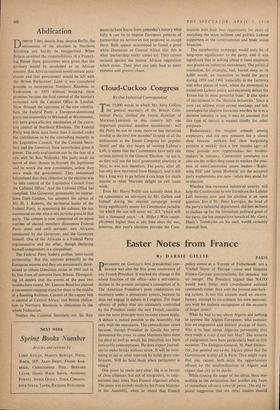Cloud-Cuckoo Congress
By Our Industrial Correspondent
PrHE 15,000 words in which Mr. John Gollan, I the general secretary of the British Com- munist Party, clothed the future direction of Marxism-Leninism in this country left one important practical question unanswered : will the Party be out to cause more or less industrial trouble in the next few months? In spite of all the enthusiasm at the Easter Congress for popular fronts and the airy hopes of wooing Labour's Left, it seems that the Communists have only one serious interest in the General Election—to use it, as they will use the local government elections in May, to .win new members. The party, after all, has only now recovered from Hungary, and it still has a long way to go before it can hope for much success in what Marxists delight to call 'mass work.'
Even Mr. Harry Pollitt can .scarcely think that an appearance on television by Mr. Gollan and himself during the election campaign would bring significantly nearer his Communist paradise 'on which the sun will never set.' (Cf. 'which will last a thousand years.'—A. Hitler.) With unem- ployment higher than at any time since the war, however, this year's elections provide the Com- munists with their best opportunity for years of snatching the more militant and gullible Labour supporters in the constituencies and trade union branches.
The membership campaign would only be of long-term significance to the party, and it was significant that in talking about it most emphasis was placed on industrial recruitment. The political resolution, for example, had, buried deep in its 6,000 words, an injunction to build the party during 1959 and 1960 'especially in the factories and other places of work, where the movement to transform Labour policy and decisively defeat the Tories has its most powerful basis.' It also spoke of recruitment in the 'decisive industries.' Since a man can address street-corner meetings and lick envelopes for election literature whether he is in a decisive industry or not, it may be assumed that this type of recruit is wanted chiefly for other purposes.
Redundancy, the tougher attitude among employers, and the new pressure for a closed shop because workers feel their bargaining position is weaker than a few months ago—all these provide new opportunities for trouble- makers in industry. Communist comrades can also use the strikes they cause to weaken the posi- tion of non-Communist union leaders—'Right- wing filth' and 'queer Herberts' are the accepted party euphemisms just now—when they stand for re-election.
Whether this increased industrial activity will help the Communists to win friends on the Labour Left between now and the election is an open question. But if Mr. Peter Kerrigan, the head of the party's industrial department, did feel inclined to slacken up for the immediate political good of the party, the hot competitive breath of Mr. Gerry Healy's Trotskyists on his neck would certainly dissuade him.


































 Previous page
Previous page